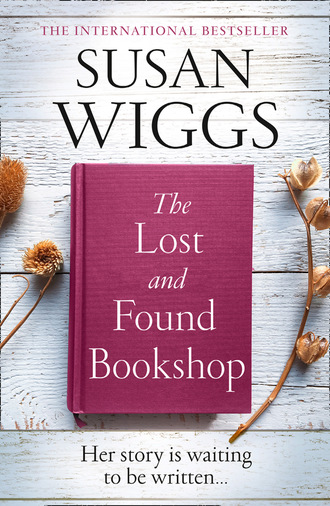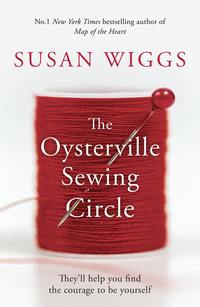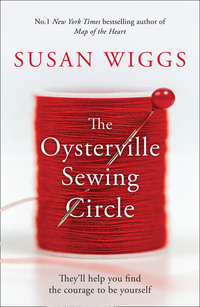
Полная версия
The Lost and Found Bookshop
Curving a hand over the top of his cane, he turned to her. A sweet smile lifted the corners of his mouth. “Ah, there you are, Blythe. I’ve been waiting for you. How nice you look. Is that a new frock?”
Natalie’s heart swelled as she crossed the room to him. Grandy had always been an immovable fixture in her life. From earliest memory, he had been present, restoring old books in the basement or chatting up customers in the shop. In the evening, he read stories aloud to her while she snuggled up to him, breathing in his comfortable scent of shaving lotion. She had learned wisdom and kindness through his gentle example.
And now he needed her. In the past week, he had frequently mistaken Natalie for her mother. Maybe the grief was too enormous to bear, and his failing mind had embossed Natalie’s face with her mother’s features. Though several days had passed since the shattering news, there were many moments when he refused to accept that his daughter—his only child—was gone.
Now that Natalie was here, she could see how full her mom’s hands had been as Blythe tried to look after Grandy. Somehow, Natalie would have to take over his care. He insisted he could manage on his own, but she wasn’t so sure. There were appointments to be kept with his doctor and various specialists. Meds to be dispensed. Meals to be prepared. Housekeeping to be done. Looking around, she spied a half-dozen projects that would make the room nicer. A bright coat of paint. A bookcase within reach. Maybe do something about the hulking old radiator that reluctantly groaned to life in winter.
In the light from the garden window, her grandfather looked wonderful to her—tall and dignified, timelessly handsome in a tailored suit and crisp white shirt she’d stayed up late ironing the night before. She knew he wanted to look his best for the service. He tugged ineffectually at his necktie. “Help me with this, Blythe. I can’t … I don’t know how …” His words evaporated into a cloud of confusion.
“Let me help.” Standing in front of him, she looped the tie in a Windsor knot, something Grandy himself had taught her to do years before. The tie was vintage Hermès, a brilliant silk print in a sundial pattern. It was probably something her mother had found in a resale shop with her unerring nose for high-end fashion at low-end prices.
“It’s me, Natalie,” she said, her throat raw from crying. “Natalie. Your granddaughter.” It felt strange and horrible to have to explain who she was to a man who used to know her better than she knew herself.
“Of course,” he said agreeably. “You look just like your mother, only sometimes I think you’re even more beautiful. And my lovely daughter would be the first to agree with me.”
“Today is her memorial,” she reminded him, finishing the tie with a gentle tug. The idea was still too enormous to grasp. She felt as if she were swimming through a fog of grief and guilt, just trying to stay afloat. If only she hadn’t assumed her stupid company party had warranted a visit from her mother. If only she had been honest with Rick instead of waiting for him to conclude that their relationship had run its course. Instead, she had orchestrated the demise of her mother and a good man in his prime.
“There’s a car waiting out front.”
“A car …?”
“The memorial,” she said again. “That’s why we’re all dressed up.”
He touched his necktie and gave her a blank look.
“Mom died, Grandy. I came as soon as I found out, and I’ve been here all week.” After learning the stunning news at Rick’s office, Natalie had jolted herself into a strange, mechanical fugue, getting into her car and driving straight down to the city to be with her grandfather. Though she scarcely remembered the drive, she kept reliving the moment she’d had to tell him. His face had lit up when she’d come through the door, and for a few precious seconds, she’d let him delight in a visit from his granddaughter.
Then she’d said the words that still didn’t seem real—Mom died in a plane crash.
Grandy had been uncomprehending, just as Natalie had been. Blythe couldn’t be gone. How could she be gone? How could she be stolen from the world, just like that?
It had taken several explanations before the understanding and deep horror penetrated his denial. A crack opened up—an earthquake. A great, unbreachable fissure. She could hear his poor heart shatter into pieces.
They had wept together, torn to bits by their shared grief. Days later, she still felt the aftershocks of the emotional devastation.
Andrew’s memory issues made a terrible situation worse. He had begun losing bits of himself—short-term memory, fine motor control, rational thinking. The doctors characterized the dementia as a mild form. Intermittent. Early stage—the awful implication being that it would progress. Increasing memory loss, disinhibition, hallucinations. Natalie’s mother had said Grandy got scared and confused sometimes, and other times, he seemed like his old self. He’d lost weight and suffered from headaches, tremors, and fatigue, which the care team couldn’t explain.
Natalie had not been prepared for how hard it was turning out to be. It made the current situation a fresh horror to him every time he forgot his daughter had been killed and had to be reminded. Did he feel the same wave of shock and grief all over again? Did he have to keep feeling that fresh pain? She couldn’t imagine having to experience the initial overwhelming stab of that first detonation of news, again and again.
Andrew took a breath. His face didn’t change. He scarcely moved. But his dark eyes reflected such an inexpressible sadness that Natalie flinched. “I know,” she whispered, taking his hand and leading him to the door. “It hurts all the time. Every waking moment.”
“Yes,” he said. “The pain is a reflection of how much we loved her.”
“You’ve always had a way with words.”
“Blythe said it runs in the family. She’s been reading Colleen’s journals.”
“Colleen. You mean your ancestor, the one who died in the 1906 earthquake?”
“The grandmother I never knew. My dear father was just seven years old when he lost her and was sent to an orphanage. He rarely spoke of that day, but I believe it haunted him all his life.”
Lately, Grandy had clearer memories of the distant past than he did of events that occurred five minutes ago. “I didn’t know about Colleen’s journals.”
“Blythe found them not long ago. I don’t know what she’s done with them.”
It was possible that the journals were a figment of Grandy’s imagination, since all they knew of Colleen O’Rourke Harper was that she’d immigrated from Ireland, had one son—Grandy’s father, Julius—and disappeared when the earthquake struck. The family history had been altered forever by a mysterious twist of fate.
Was that what happened to you and Rick, Mom? Natalie wondered. A twist of fate? Or had Natalie herself orchestrated it when she’d invited her mother to the company party? Every day, she wished she could snatch back that moment.
She paused at the hall tree by the door as her grandfather went through his familiar going-out routine. First, the soft, wispy neck cloth. Then the overcoat, the black fedora, and finally the cane. No umbrella needed today. It was foggy and damp but not raining. The bright yellow leaves of early autumn were decoupaged against the pavement.
He held the door for her and she stepped through. “Do you want the wheelchair?” she asked.
He hesitated, looking down at the chair, his face creased with pain. “No,” he said. “I’ll walk into my daughter’s memorial and stand to speak at the podium.”
The dignified response tore at her heart as she slowly led the way down the narrow hall, past a storage room stacked with books, through the back office, and then into the bookstore showroom.
When she was a girl, Natalie used to start each day by skipping through the shop, calling good morning to her favorites as she passed them—Angelina Ballerina, Charlotte and Ramona, Lilly and her purple plastic purse. Then she would let herself out to catch the bus to school. Now a big portion of the shop was littered inside and out with tributes and notes of sympathy from the many people who had known her mother.
The front door was hung with a Closed sign and a printed announcement of the memorial. A CELEBRATION OF THE LIFE OF BLYTHE HARPER.
Why was it called that when the last thing a grieving daughter wanted was a celebration?
She opened the door and cleared a path through the piled tokens that had been spontaneously left there—bouquets of flowers, dogeared novels and memorabilia, candles and handmade sketches and cards. The Lost and Found Bookshop had been a fixture on Perdita Street for as long as Natalie had been alive, and the sudden demise of its owner had inspired a huge, loving, and immensely sad reaction.
One thing Natalie had never wondered about until now: After the explosion of tributes, then what? Who picked up the wilted flowers, the rain-soaked poems, the blurred photos, the jarred candles?
The waiting black car smelled of canned deodorizer. The driver helped her grandfather into the back seat. Traffic was heavy even on a Saturday morning, and the drive to the Flood Mansion crawled along through wispy snakes of fog, past trees twisted and shaped by the wind, and along the slanting rooflines of the city’s Victorian Painted Ladies. Ringing cable cars lurched past bustling cafés and shops. As they wended their way upward, they broke through the fog and entered another microclimate, a sky of eye-smarting clarity that illuminated the city’s most splendid panoramas.
This had been Blythe Harper’s city, this peninsula crowned by forty-three “official” hills and surrounded by water, a place she swore she’d never leave. Yet she had left it, never to return, and now Natalie and Andrew had to scramble through the dark maze of unexpected grief.
“She told me she would be back on Friday night,” said Grandy, his eyes once again misted with confusion.
“That was her plan,” Natalie acknowledged.
“What the devil happened?”
Her mouth went dry. She said nothing.
“Natty-girl,” he said, using her nickname, “I know I’m forgetful, but I deserve to hear the truth.”
She nodded. She’d already told him. He needed her to go through it again. “I’m sorry, Grandy. It’s hard for me to talk about, because I feel as if I caused it. I wanted Mom to come up for some stupid company thing. I didn’t realize she and Rick were planning to surprise me by showing up together. He told me he had a test flight, but that was just a ruse. Instead, he flew down here and picked her up at Pier Thirty-Nine. They would have landed at the Archangel airstrip at around three that afternoon. But something went wrong during the flight.”
“Your Rick is an expert pilot.”
She folded her hands together and squeezed until it hurt. “He was. Oh, Grandy.” She remembered the fleeting thought she’d had that the female passenger in his plane had been someone he was cheating with. What a horrible thing to think about a man who was only trying to make her happy.
The memorial for Rick had taken place in Petaluma the day before. Natalie had dragged herself there, enduring a virtual gauntlet of headshaking and consoling friends and acquaintances. Every tribute and eulogy had attested to his expertise, his professionalism.
“If he was such an expert, then how could he have crashed?” Grandy wondered.
“The NTSB is still investigating,” she said, hoping she wouldn’t need to explain the details yet again.
She had culled through the preliminary reports, as if knowing exactly what had gone wrong would make the tragedy less cataclysmic. According to the report, the amphibious light sport aircraft was flying too low and—probably due to fog—mistakenly entered a canyon surrounded by steep terrain. Investigators postulated that the pilot thought he was in a different canyon that led to the larger, open portion of the lake. Right before the crash, a local man who was fishing in a boat spotted the plane about fifty feet over the water.
“As the plane swooped low, I waved to the pilot and he waved back,” the witness had said. “Everything seemed normal. I figured they were just buzzing over the lake or coming in to land on the water. A few seconds later, I heard the engines rev up and accelerate hard. Guess he was trying to turn.”
Once Rick realized there was no exit from the canyon, he attempted a 180-degree turn to escape. Based upon performance limits, the airplane would not have been able to climb past the steeply rising terrain.
The plane flew behind a point and then the man heard a loud crash. He sped in his boat to find the site. Approaching a cove, he spotted the wreckage and yelled out, but there was no response. He called 911.
Officials from the sheriff’s office, the Federal Aviation Administration, and rescuers from Cal Fire and the U.S. Bureau of Reclamation were led to the crash site. They speculated that the marine layer had caused Rick to mistake one canyon for another. By the time he figured out his orientation, there wasn’t enough space to pull up.
Natalie shuddered, haunted by the image. Over and over, she pictured those final seconds, imagining what her mother must have been feeling—the flash of realization, the panic, the terror. She told her grandfather what she’d learned but didn’t share the further details in the report. The blood. The motionless bodies found by the fisherman.
“They were both gone on impact,” she told Grandy.
He reached over and covered her hand with his. “I never met your Rick in person. I wish I had.”
He was never my Rick, thought Natalie. “At the memorial yesterday, his sister gave me something,” she blurted out.
“What’s that?”
She reached into her handbag. “This was zipped into a pocket of his flight vest.” She handed the small box to her grandfather.
“A diamond ring,” he said, taking it in a hand unsteady with tremors.
“Rick was going to surprise me with a marriage proposal,” Natalie said. “I assume he wanted my mom there when he asked me.”
“Yes, that was his plan,” Grandy said. “When we spoke on the phone—”
“You spoke with him?” Natalie felt nauseated.
“Indeed I did. He told me what he intended to do. He wasn’t exactly asking my permission, but he wanted me to know that he loved you. He wanted to make a life with you.”
Her throat clogged with inexpressible grief. Then she choked out, “He told you and Mom? You knew?” Surely not. Maybe this was one of Grandy’s episodes—delirium was the doctor’s term for it.
“Rick had a lovely plan,” Grandy continued. “He was going to ask you to marry him, and then fly you and your mother back to the city. He had a suite booked for the two of you at the Four Seasons on Nob Hill. It made me supremely happy to know such a fine young man wanted to marry you. I never dreamed it would go so wrong.” His hands shook as he straightened his tie. “Blythe never found anyone, and she always feared it would be the same for you. She believed Rick would be the one.”
Natalie put the ring away. “When I told her I was having doubts, she didn’t want to hear it. I don’t know what to do, Grandy. What should I do?”
He regarded her blankly. This was one of his lost moments. She was beginning to recognize the signs—the distant stare, the agitated hand movements, the impenetrable expression.
Realizing she was truly on her own with this, she gazed out the car window. While Rick had been plotting a surprise proposal and a romantic getaway, she had been contemplating the most civil, low-key way to break up with him. The very moment he’d been flying with her mother, a gorgeous engagement ring tucked into his vest, Natalie had been imagining life without him.
She kept expecting him to be the first to call it quits. Instead, he was buying a diamond ring, secretly plotting a marriage proposal and a whisk-you-away couple’s weekend. Marriage.
It would have been a surprise, all right. In the most terrible way. How could she have read the situation so wrong?
Attending his memorial had been painful and teeth-grittingly awkward. His family was made up of very nice people who had assumed Natalie, too, was very nice. She wasn’t nice. Couldn’t they see that? She felt especially not-nice when Mandy appeared at the service, her expressions of sympathy as hollow as Natalie’s heart.
His sister had handed her the ring box. “He loved you so much. He would have wanted you to have this.”
Natalie hadn’t dared to touch the ring, nestled on its bed of velvet. “Please. I couldn’t.”
“I realize you’re emotional now. You’re not thinking straight.” Rhonda had dropped the box into Natalie’s purse. “You don’t ever have to wear it. Or you could repurpose it, maybe have it made into something else. Or sell it and use the proceeds for something you care about. Rick would’ve liked that.”
“It doesn’t seem right,” Natalie had said.
“Nothing about this whole situation seems right.” Rhonda’s voice caught on a sob and she gave Natalie a brief hug. “I’m sorry we never got the chance to be sisters.”
Natalie felt like a monster.
She was a monster.
The town car drew up at the mansion, a sumptuous crown atop a hill overlooking majestic views of the Bay Area—the bay itself, the Golden Gate Bridge, and the hills of Marin County.
“This building has a romantic story,” Grandy said, seeming to snap out of his silence. “After the great earthquake, Maud Flood was so afraid of fire that her husband built her a grand house of marble atop this granite hill. He wanted to give her a new place made entirely of stone, so she would feel safe.”
“Now that,” Natalie said, “is a good husband.” Rick would have made a good husband, she thought, immersing herself again in guilt. He had been caring, and cautious, and he knew how to look after things. He was steady and stable, her two favorite qualities not only in people but in life itself.
A pair of white-gloved attendants held the door for her and Grandy. Someone in the foyer took their coats and Grandy’s hat to the cloakroom. A beautifully rendered poster on an easel welcomed guests to the celebration.
Bryan Ferry’s voice crooning “Avalon” drifted from unseen speakers. Mom had loved Roxy Music. On a sleepless night a few days before, Natalie had put together a playlist from Blythe’s digital music library.
Natalie nearly stumbled as they passed the gallery of enlarged photos on display in the rotunda. The grief was like a punch to the gut. Breath-stealing agony made her want to crawl out of her skin. Her knees would have given out if not for her grandfather. Though he moved slowly and leaned on the cane, he was strong. With her careless father so notoriously absent, Grandy had been the key man in Natalie’s life, a fact she was grateful for every single day.
She, Grandy, and the staff and friends of the bookstore had collected pictures of her mother, raiding old albums and digital files and sending them to a gallery that specialized in large-scale renderings and displays. The result was a beautiful frieze of images that captured Blythe’s energy and beauty and spirit.
There she was, a girl in the seventies, picking berries on a farm somewhere. A young woman proudly posing in her cap and gown in Berkeley blue and California gold. An impossibly young mother, surrounded by gauzy light through a window, holding her infant daughter in her arms, her expression a mixture of pride and terror. A woman standing with her cat at the grand open doorway of the Lost and Found Bookshop, in all her glorious vivacity. A soft-eyed daughter sweetly hugging her aging father.
The final portrait was Natalie’s favorite picture of her mother. No one knew who had taken the photo of Blythe standing on the beach at Fort Funston at the southwest edge of the city, gazing off into the distance, her expression enigmatic. To Natalie, beneath the joyous spirit everyone had loved, Blythe had always seemed just a bit sad. Sometimes, growing up, Natalie had been struck by the thought that she didn’t really know her mother. And now it was too late.
Even more moving than the photo gallery was the size of the crowd. As Natalie accompanied her grandfather to their seats in the front, he said, “I always pictured walking my daughter down the aisle at her wedding, not her funeral.”
She nearly stumbled when she heard those words. Only her determination to support him kept her steady. The assemblage was packed to the walls already, and more people were still streaming in. A velvet rope hung across a section in the front, demarcating a few seats with a card that read Reserved for Family.
In the strictest sense, they only needed two seats—one for her and one for Grandy. Blythe’s mother was long gone. Lavinia had gone away when Blythe was a baby, leaving disaster and scandal in her wake. As for Natalie’s father, Dean Fogarty, he likely had heard about the memorial, but he was as much of a no-show today as he had been for Natalie’s entire life.
Her family had consisted of the three of them. And now, all of a sudden, there were two. Natalie and Grandy. And her grandfather seemed to be leaving her in small, heartbreaking pieces.
She recognized many of the attendees—her mom’s friends, customers who had frequented the shop over the years, even salespeople from New York, publishers and colleagues in the book industry—people who had depended on her taste and opinions. There were authors whose books had graced her shelves, local merchants and neighbors from the tree-shaded enclave of Perdita Street.
Guests on both sides of the aisle offered tentative waves, mouthed expressions of sympathy and hand-over-the-heart gestures.
No one knew what to say to people facing a grief so big and shocking. Natalie wouldn’t know, either. She had a hard time meeting their eyes, feeling irrational shame, or perhaps guilt.
She and Grandy took their seats facing the podium, festooned with sweet-smelling native lilies and autumn mums from the Bonner Flower Farm up in Glenmuir, organic and sustainable, the way Blythe would have wanted. A swag of Buddhist prayer flags hung overhead. Her mother had never subscribed to a particular dogma, claiming organized religion was the cause of too much violence and strife in the world. But she often spoke of her favorite spiritual books, including Buddhism’s The Noble Eightfold Path, and admitted happily that she was drawn to the all-loving and nonviolent tenets of Buddhism.
The smooth-sided urn was overshadowed by another portrait of Blythe Harper, this one larger than all the rest in the gallery. Natalie had chosen it herself. Blythe was in her favorite spot in the bookstore—a cushy chair littered with throw pillows, angled near the lace curtain of the shop’s front display window. The natural light, filtered through the antique lace, illuminated the fine features of her mother’s face, framed by wispy dark curls, smiling lips, and eyes that were bright with ideas. The book in her lap was a poetry collection of Mary Oliver, which most people knew was a favorite of Blythe’s. The caption under the photo was a line from a well-known poem: Tell me, what is it you plan to do with your one wild and precious life?
Natalie had chosen the quote, too. She settled back and tried to focus on the display. The images blurred together like a ruined watercolor. She checked her bag, touching the folder with her eulogy notes. There was no way to express this terrible goodbye, but she’d scraped her soul to find the right words.
Grandy leaned his cane on the seat back and stared straight ahead.
Natalie tucked her arm around his and wondered when she would stop feeling like she was on the verge of tears. “How are you doing?”
“I’m maintaining calm,” he said simply.
His lifelong friend, Charlie Wong, in a fine black jacket with a Nehru collar, arrived and sat down next to Grandy. A talented diorama artist, Charlie had known Andrew when both were young boys running around the city. Many years ago, Charlie had created an art piece based on the bookstore building, which was then Grandy’s typewriter shop. Now the two old men got together several times a week, going to dinner at one of Charlie’s daughters’ homes or attending game night at the local senior center. Charlie’s usual smile was in place, yet dimmed by the sadness in his eyes.








